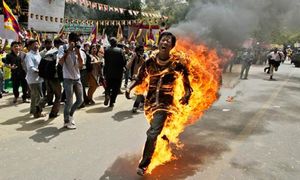 A Tibetan exile has
set himself on fire at a demonstration in central Delhi a day before a visit to India by China's president.
A Tibetan exile has
set himself on fire at a demonstration in central Delhi a day before a visit to India by China's president.
Jamphel Yeshi, a 27-year-old Delhi resident, doused himself with petrol during a protest at the Jantar Mantar observatory a few hundred yards from India's parliament.
He was engulfed by flames before fellow activists put out the blaze with Tibetan flags and rushed him to hospital. But with burns to 90% of his body, it is unlikely he will survive, officials said.
More than 500 demonstrators marched across Delhi to protest against the visit by the Chinese president, Hu Jintao, who will arrive on Tuesday for two-day summit of emerging powers. At the site of the protest, a large poster of Hu – with a bloody palm print over his face – said: "Hu Jintao is unwelcome."
Yeshi fled from Tibet in 2006 and had been living in New Delhi for the past two years, activists said. Organisers of the protest insisted they were not behind the self-immolation. "We have no idea how this happened, but we appreciate the courage," said Tenzing Norsang, an official with the Tibetan Youth Congress. He called on the international community to talk about Tibet at the summit, which is to be attended by leaders from Brazil, Russia, India, China and South Africa.
"If you care about peace you should raise the issue of Tibet," he said. "Hu Jintao is responsible for what is happening there."
About 30 people have set themselves on fire over the past year, calling for the return to Tibet of the Dalai Lama and to protest against Chinese rule over their homeland. Twenty have died. Many have been monks or nuns but others have included farmers, students and even schoolchildren. The Dalai Lama, who fled Tibet amid a failed 1959 uprising against Chinese rule, has blamed China's "ruthless policy" for the self-immolations. China accuses the Dalai Lama of stirring up trouble.
China says Tibet has always been part of its territory and says the protesters who self-immolate are criminals or "separatists". Tibetans say the Himalayan region was virtually independent for centuries.
A spokesman for the Tibetan government in exile told the Guardian that these "extreme actions" were the result of "frustration".
"We do not want them to do this. We need these people to sustain our movement in the future. There is no evidence that [the self-immolations] are orchestrated by the Dalai Lama. China has failed to understand the nature of our struggle," the spokesman said.
Monday's was the second self-immolation in India in recent months. Last year, a young Tibetan exile set himself on fire outside the Chinese embassy. That man suffered minor burns. Most of the recent incidents have been in a broad swath of the east of what was historically considered Tibet but which is now inside the Chinese provinces of Gansu, Qinghai and Sichuan.
Some experts say this is because issues of cultural identity in these more mixed regions are problematic for young Tibetans living there compared to the Tibetan heartland. Others say it is simply because the authorities have less control, with fewer restrictions on the internet for example.
Steve Tsang, professor of contemporary Chinese studies at Nottingham University, said he did not believe the self-immolations would stop soon. "I can't really see how it is going to stop. The individuals who have committed this act are still being seen in a very positive light [by their community]," he said.
Police in New Delhi are bracing for protests by the tens of thousands of Tibetan exiles who live in India in coming days. Security around the summit location has been tightened, and roads leading to the hotel will be closed to the public a day before the meeting.
Source: http://www.guardian.co.uk/world/2012/mar/26/tibetan-protester-on-fire-india

/image%2F0994931%2F20220514%2Fob_0ba45b_picture-interview2.jpg)